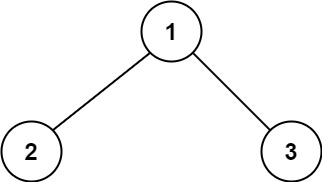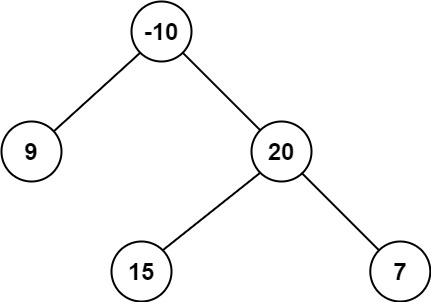LeetCode-in-All
124. Binary Tree Maximum Path Sum
Hard
A path in a binary tree is a sequence of nodes where each pair of adjacent nodes in the sequence has an edge connecting them. A node can only appear in the sequence at most once. Note that the path does not need to pass through the root.
The path sum of a path is the sum of the node’s values in the path.
Given the root of a binary tree, return the maximum path sum of any non-empty path.
Example 1:

Input: root = [1,2,3]
Output: 6
Explanation: The optimal path is 2 -> 1 -> 3 with a path sum of 2 + 1 + 3 = 6.
Example 2:

Input: root = [-10,9,20,null,null,15,7]
Output: 42
Explanation: The optimal path is 15 -> 20 -> 7 with a path sum of 15 + 20 + 7 = 42.
Constraints:
- The number of nodes in the tree is in the range
[1, 3 * 104]. -1000 <= Node.val <= 1000
To solve the “Binary Tree Maximum Path Sum” problem in Java with a Solution class, we’ll use a recursive approach. Below are the steps:
-
Create a
Solutionclass: Define a class namedSolutionto encapsulate our solution methods. -
Create a
maxPathSummethod: This method takes the root node of the binary tree as input and returns the maximum path sum. - Define a recursive helper method: Define a recursive helper method
maxSumPathto compute the maximum path sum rooted at the current node.- The method should return the maximum path sum that can be obtained from the current node to any of its descendants.
- We’ll use a post-order traversal to traverse the tree.
- For each node:
- Compute the maximum path sum for the left and right subtrees recursively.
- Update the maximum path sum by considering three cases:
- The current node itself.
- The current node plus the maximum path sum of the left subtree.
- The current node plus the maximum path sum of the right subtree.
- Update the global maximum path sum if necessary by considering the sum of the current node, left subtree, and right subtree.
-
Initialize a variable to store the maximum path sum: Initialize a global variable
maxSumto store the maximum path sum. -
Call the helper method: Call the
maxSumPathmethod with the root node. - Return the maximum path sum: After traversing the entire tree, return the
maxSum.
Here’s the Java implementation:
class Solution {
int maxSum = Integer.MIN_VALUE; // Initialize global variable to store maximum path sum
public int maxPathSum(TreeNode root) {
maxSumPath(root);
return maxSum; // Return maximum path sum
}
// Recursive helper method to compute maximum path sum rooted at current node
private int maxSumPath(TreeNode node) {
if (node == null) return 0; // Base case
// Compute maximum path sum for left and right subtrees recursively
int leftSum = Math.max(maxSumPath(node.left), 0); // Ignore negative sums
int rightSum = Math.max(maxSumPath(node.right), 0); // Ignore negative sums
// Update maximum path sum by considering three cases:
// 1. Current node itself
// 2. Current node + maximum path sum of left subtree
// 3. Current node + maximum path sum of right subtree
int currentSum = node.val + leftSum + rightSum;
maxSum = Math.max(maxSum, currentSum); // Update global maximum path sum
// Return the maximum path sum that can be obtained from the current node to any of its descendants
return node.val + Math.max(leftSum, rightSum);
}
// Definition for a binary tree node
public class TreeNode {
int val;
TreeNode left;
TreeNode right;
TreeNode() {}
TreeNode(int val) { this.val = val; }
TreeNode(int val, TreeNode left, TreeNode right) {
this.val = val;
this.left = left;
this.right = right;
}
}
}
This implementation follows the steps outlined above and efficiently computes the maximum path sum in a binary tree in Java.

